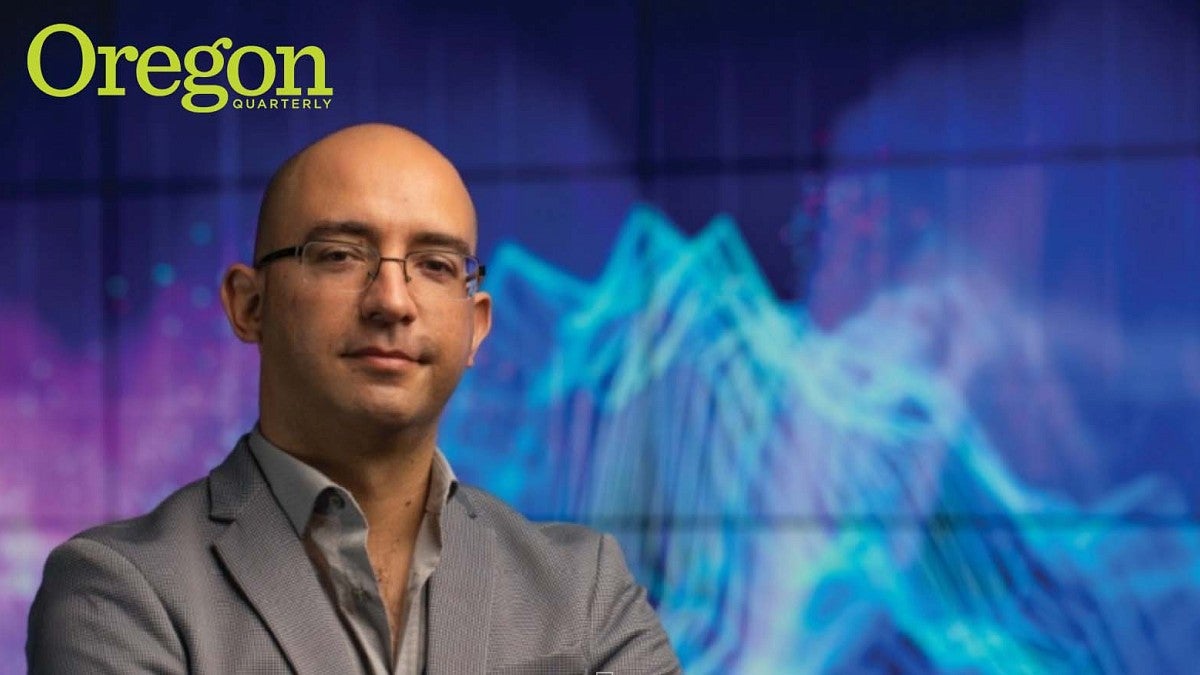“There’s something very peculiar about computers and the way that computers understand our world,” says Ramón Alvarado. “I see two immediate avenues for the humanist scholar to engage with information technology: questions about epistemology—the nature of knowledge—and questions about ethics.”
A member of the University of Oregon Presidential Initiative in Data Science, Alvarado studies computers and how people use them.
He recalls, in graduate school, how the emerging field of complexity science led him to observe that breakthroughs in various areas were made possible only through computer programming. He’s been grappling with technology’s role in knowledge creation ever since.
Says Alvarado: “I began to recognize how technological mediation—the ways technology, like language, is used to navigate the world—has many consequences for public policy, business practices, and even how we all relate to one another.”
DATA ETHICS
Alvarado notes that mobile phones transmit data about users to corporate servers every few seconds. Your phone also likely contains a gyroscope, a thermometer, and other utilities that are constantly in contact with your internet service provider and other entities.
“Without even thinking about it,” he says, “we’re creating data about ourselves all the time.”
Nor do we spend much time considering the “rights and wrongs” of how our data is captured and manipulated, Alvarado says. Even among scholars, the field of data ethics—and how to define it—is open to debate.
“In my view as a philosopher,” Alvarado says, “data ethics is in large part about how we gather data about human subjects and what we do to one another with that data once we have gained access to it.”
For Alvarado, particularly worrisome is aggregated metadata—data sets that summarize information about other data files. Metadata commonly includes details such as authorship and location. When entities with financial or political interests gather metadata, ethical questions arise.
“It’s not the picture you post that these people are interested in—it’s the metadata attached,” Alvarado says. “Your metadata is far more valuable for inferring things about you, and the creation of metadata is largely involuntary. So, what is the basis for us to claim ownership of our metadata?”
CROSS-CONNECTIONS
In addition to teaching, Alvarado lectures on computational ethics to undergraduates studying mathematics, statistics, and machine learning.
“It’s wrong to say people are resistant to collaborating across STEM and humanities fields,” Alvarado says. “More accurately, people are still learning how. But I’ve always found once the lines of communication are established, it’s very enriching for all.”
SPECULATIVE FICTION—OR PHILOSOPHICAL TRUTH?
Alvarado has long been an avid reader of science fiction. In our collective unease about the digital world, he hears the echo of a law proposed by Arthur C. Clarke in his 1962 book, Profiles of the Future.
“A magician is not afraid of magic, because they know the trick,” Alvarado says. “But 99.9 percent of us have no role in building these vastly powerful computational systems—so we fear the machine in the same way our ancestors feared magic or natural disasters. There’s an element of wonder in our anxiety.”
—By Jason Stone, a staff writer for University Communications
—Photo by Dustin Whitaker, University Communications
The Presidential Initiative in Data Science empowers researchers, students, and communities to improve society through a greater understanding of data. Its uniquely Oregon, ethical mindset asks both what can we do, and what should we do? It is one of the UO’s academic initiatives, working across disciplines, developing the next generation of leaders and problem solvers.


